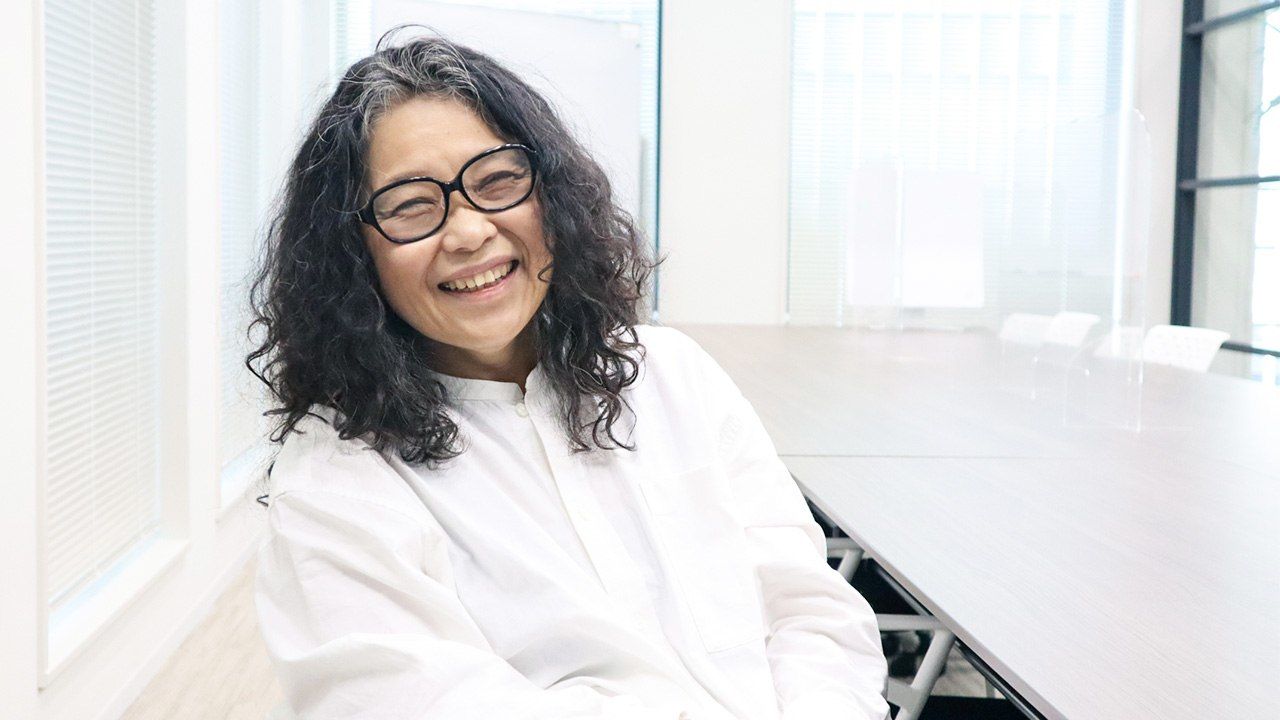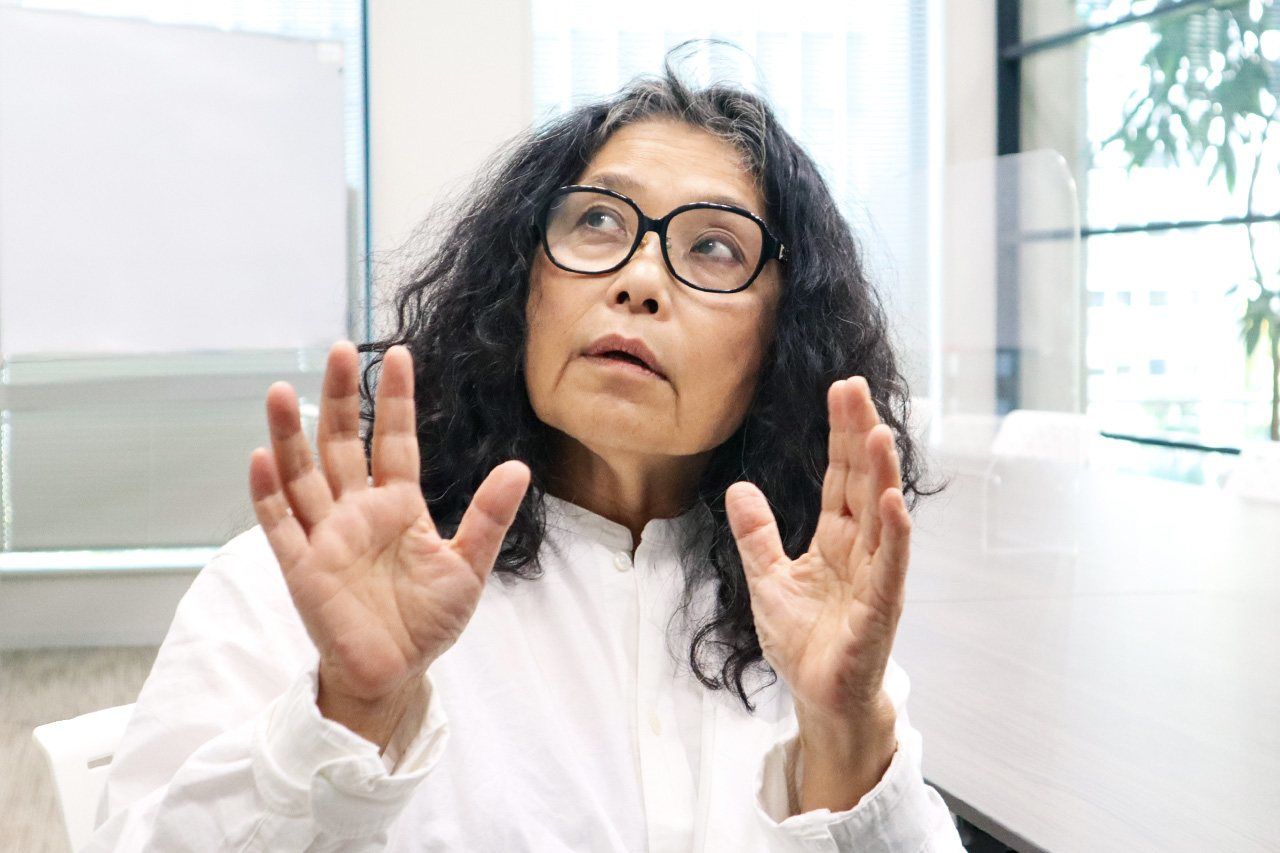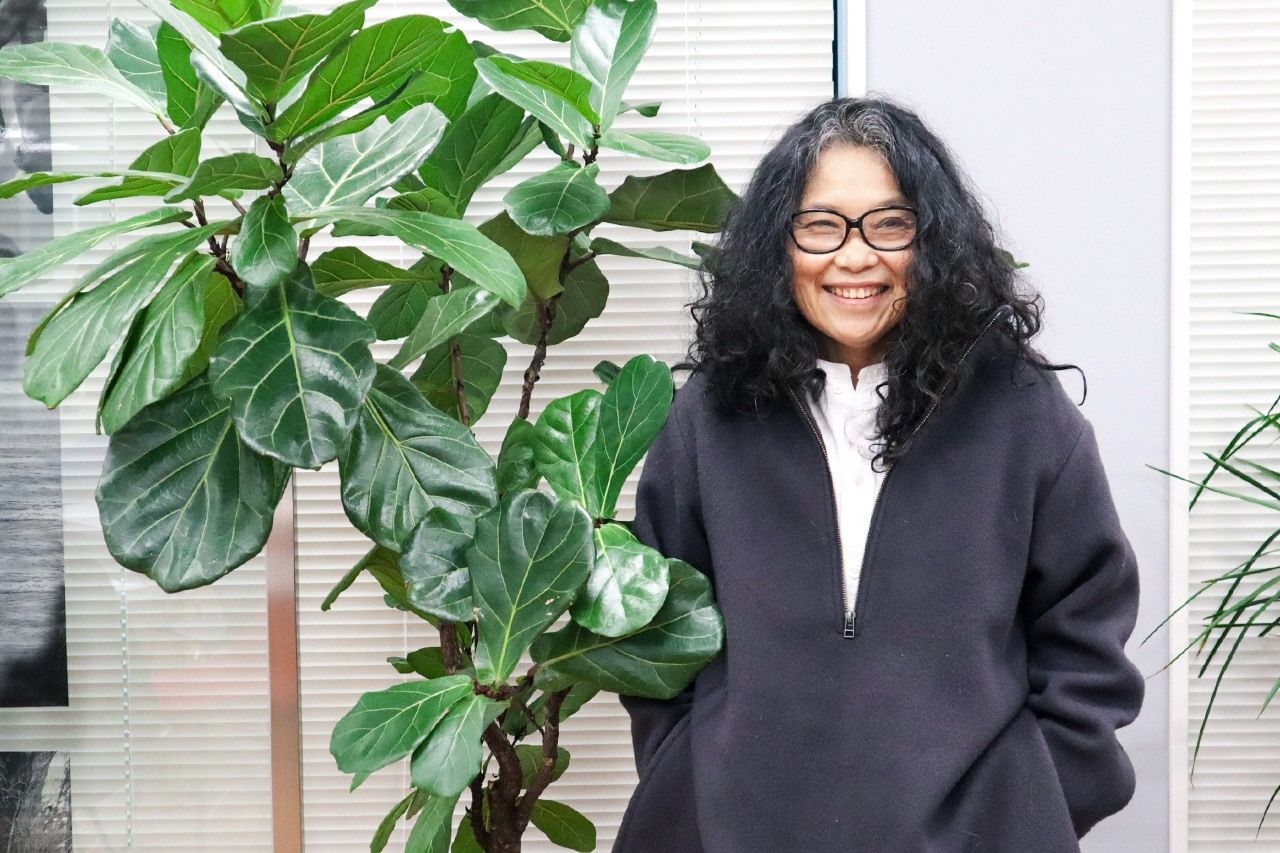
Poet Itō Hiromi: A Woman’s Journey
People Culture Society- English
- 日本語
- 简体字
- 繁體字
- Français
- Español
- العربية
- Русский
Poet and essayist Itō Hiromi has lived an eventful and tumultuous life. In the wake of mental health struggles, an unhappy affair, and two failed marriages, she relocated to the United States to live with British artist Harold Cohen, 30 years her senior, and found herself flying between California and Kumamoto Prefecture every month as she juggled the demands of her three daughters, her aging parents, and finally her dying partner. Through it all, she built an impressive body of literary work reflecting her experience of everyday life while plumbing the depths of her own psyche and challenging social and literary mores.
Busting Stereotypes and Genres
Itō initially attracted notice with her unflinchingly honest treatment of female sexuality, pregnancy, childbirth, and motherhood. Her poem “Kanoko-goroshi” (Killing Kanoko) conjured up disturbing images of breastfeeding juxtaposed with brutal talk of abortion and infanticide. Her collection Yoi oppai, warui oppai (Good Breasts, Bad Breasts) struck a deep chord with young Japanese mothers as it challenged the received wisdom about what constitutes a “good mother.” More recently, aging and death have emerged as dominant themes. Her vivid descriptions of the day-to-day struggles of childrearing and caregiving alternately elicit vigorous nods of sympathy and bursts of laughter.
Itō’s works are often genre-defying, blurring the lines between prose and poetry. Her 2007 Togenuki: Shin Sugamo Jizō engi draws inspiration from a traditional genre of Buddhist storytelling known as sekkyō-bushi (sermon-ballads) to describe her experiences juggling the care of aging parents, growing children, and her partner. The English translation by Jeffrey Angles, The Thorn-Puller, is set for publication in August 2022.
“I haven’t written a ‘poem’ as defined in the Handbook of Contemporary Poetry [the magazine Gendaishi techō] for more than ten years now,” says Itō. “Still, I look on everything I write as poetry on some level.”
Indeed, all of Itō’s writing, however prosaic its subject matter, exhibits a poet’s passion for the music and nuance of the Japanese language, together with a commitment to probe beneath the surface of human experience.
Poetry as Exorcism
For three years, beginning in 2018, Itō taught creative writing at Waseda University in Tokyo.
“While supporting my students in their earnest writing endeavors, I found myself revisiting the whole question of what it means to write poetry. I would tell them, You can’t just put your emotions down on paper, you need to get beyond that. Everyone has deeply buried thoughts and feelings that they don’t even realize they have. The words that spring forth as you write, without any conscious intent, are an expression of your unconscious mind. When you work those words into something that speaks directly to the reader’s heart, without any need for explanation, that’s poetry. In teaching, I rediscovered the truth that for me, writing poetry is a way of probing my unconscious mind.”
Itō compares poetic composition to dreaming, recalling her own experience following the death of her beloved father. Her mother, who had died three years earlier, had been a hospitalized invalid for five years before that. During the eight years that her father had lived alone, Itō had done everything in her power to support him, hiring home caregivers, flying from California to Kumamoto once a month to be with him, and talking to him by phone every day when they were apart. Still, she was plagued by feelings of guilt when he died.
“I was his only daughter. I should have been with him. Why did I abandon him and go off to live in America? For some time after he died, that was all I could think about. I began having vivid dreams every night, and each time, I would wake up with a feeling that I had dived a little deeper into my consciousness. The dreams finally took me to a place of acceptance, where I understood that it was okay.”
As a teacher, Itō realized that poetry writing played a similar role. By uncovering, crystallizing, and encapsulating her deepest feelings, it had allowed her to exorcise her demons and move on.
Narrating a Woman’s Journey
Itō’s experience with pregnancy and childbirth was a turning point in her career as a writer. It was then that she began consciously writing with female readers in mind.
“When I attended prenatal classes [in Japan], the expectant mothers all seemed so happy to be talking with one another about their constipation. When I went out in public with my big stomach, older women would touch my belly and go on and on about their own experiences with pregnancy and childbirth. I felt I was witnessing those rare moments when women reach out to one another. That’s what first inspired me to write a series of essays offering encouragement to women who were feeling exhausted and overwhelmed by motherhood.”
Between the ages of 35 and 40, Itō’s mental health deteriorated as she wrestled with family issues, an unhappy love affair, and her own inner demons (including a recurrence of the eating disorder of her youth).
“I think it was what people today would call depression or maybe a stress disorder. I felt that I needed to keep moving just to stay alive, so I traveled around compulsively from town to town giving readings and lectures. Along the way, I realized that my work and lifestyle had a lot in common with Japan’s traditional sekkyō-bushi Buddhist storytellers.”
Sekkyō-bushi, or sermon-ballad, is a genre of chanted Buddhist storytelling that emerged as a form of popular entertainment in the medieval era. Itō’s encounter with the genre inspired her to channel her literary impulses into the creation of quasi-mythical narratives centered on women and their timeless struggles with romance, marriage, childbirth, breastfeeding, parenting, and—last but not least—caregiving.
“Of course, women’s experiences vary a lot. Not everyone chooses to have children, or can. On the other hand, in my own circle of friends, all of us found ourselves dealing with the challenge of aging parents at roughly the same time. That’s when it really hit home for me that every woman is someone’s daughter. I felt a much stronger sense of sisterhood then than I had as an expecting and new mother. In our patriarchal society, the hardships of caring for elderly and dying parents fall much more heavily on daughters than on sons. But I’m truly grateful to have tasted that hardship.”
Buddhism as Japan’s Literary Wellspring
Itō’s interest in Buddhism deepened as her parents neared the end of their lives. Lacking the will to live yet unprepared for death, they could only wait helplessly. When they brushed off her suggestion that they take comfort in the teachings of Buddhism, she decided to immerse herself in those teachings, an undertaking that inevitably led to a study of the sutras.
The Buddhist texts used by Japanese priests are early Chinese translations of sutras that were originally written in Pali or Sanskrit, and even Japanese translations intended for lay people are generally written in a stiff and archaic style. Reading those turgid texts, Itō conceived the idea of translating them into her own brand of modern Japanese.
Through her study of the sutras, Itō came to appreciate the fundamentally Buddhist roots of traditional Japanese literature, from the Tale of Genji and the songs of the Ryōjin hishō to nō drama and rakugo storytelling. She also learned that the sutras themselves, much like sekkyō-bushi, began as narratives developed by itinerant monks who traveled from town to town delivering sermons, and sometimes exchanging words with their listeners. With such scenes vivid in her mind’s eye, Itō felt inspired to play her part in the process, channeling Buddhist teachings by reading the sutras aloud in her own vernacular translation, as poetry.
Someday We Must Die—Until Then We Live
It was in the midst of this trial-and-error undertaking that Itō lost first her parents and then, in 2016, her longtime partner Harold Cohen. Her 20-year relationship with Cohen had been turbulent throughout, but his passing left her bereft.
How do we deal with our own mortality and the death of loved ones? With this most fundamental question in mind, Itō turned to the Sutra of the Buddha’s Last Instructions, which purports to contain the final instructions that Gautama Buddha bequeathed to his disciples before entering nirvana. One passage (translated into English from her contemporary translation) reads as follows.
Monks, do not lament, do not grieve.
However long I might live,
Someday I must die. Until then I live.
Someday we must part. Until then we meet.
Working mainly in the United States, Itō produced translations of the Heart Sutra, the Lotus Sutra, and the Amitabha Sutra, as well as the aforementioned Sutra of the Buddha’s Last Instructions. In November 2021, she published a collection of those translations titled Itsuka shinu, soremade ikiru: Watashi no okyō (Someday I Must Die, Until Then I Live: My Sutras). Interspersed among the Buddhist texts are personal essays recording long walks with her dog along the beach or through barren landscapes, watching the sun set and the moon rise, observing the lives and deaths of small creatures, all integral to nature’s eternal cycle.
Even today, Itō does not consider herself a religious person, but she has been deeply influenced by the spiritual teachings of Buddhism.
“The enlightenment achieved by the Buddha is a state of mind divorced from the worldly conventions and constraints that bind us, and it seems to me that hosshin [the resolve to embark on the Buddhist path] is a personal realization that one can’t keep on living the way one has lived—that one needs to get to a place “beyond” these worldly constraints. I’ve lived for decades bound by rules of all kinds. But I feel now there must be a different way of life, transcending all that. Maybe what I was trying to convey in my book was how I personally arrived at that realization.”
The Journey Continues
As an emigré, Itō thrived on the freedom American society offered, but she also felt like an outsider. It was the publication of two of her collections in English translation—Killing Kanoko in 2009 and Wild Grass on the Riverbank in 2014 (both translated by Jeffrey Angles)—that convinced her that she had finally found a home for herself as a poet. Even after Cohen died, she was determined to remain in California. Then came the invitation to teach at Waseda University, bringing her back to Japan in 2018.
In August 2021, Togenuki was published in German translation, and that autumn, Itō traveled to Germany to give readings with Irmela Hijiya-Kirschnereit, the book’s translator and a personal friend. In 2022, the centennial of the death of Meiji literary giant Mori Ōgai (1862–1922), she plans to spend three months in Germany researching the pioneering writer, who studied in Germany and introduced the Japanese public to German literature. Itō is a dedicated fan of Ōgai.
“I’ve reached a good stopping point in my sutra translations, so now I’d like to start on a new project,” she says. “Instead of just reacting to daily life as I experience it, I want to build a creative universe of my own.”
(Originally written in Japanese by Kimie Itakura of Nippon.com and published on December 24, 2021.)

